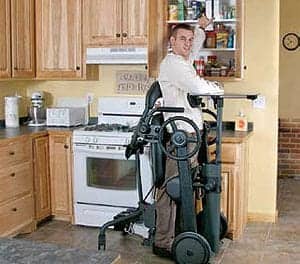Physical intervention plans that included exoskeleton-assisted walking helped people with spinal cord injury evacuate more efficiently and improved the consistency of their stool, researchers from Kessler Foundation and others suggest, in Journal of Clinical Medicine.
Bowel dysfunction, a common experience after spinal cord injury, can lead to chronic constipation and incontinence, causing discomfort and frustration. In one survey, more than a third of men with spinal cord injury reported that bowel and bladder dysfunction had the most significant effect on their lives post-injury. Unfortunately, these issues are not easily managed.
Rehabilitation professionals have traditionally managed bowel dysfunction using approaches that target the gastrointestinal system or require manual intervention, but some newer research suggests that physical activity and upright posture may enhance bowel motility.
However, few studies have explored the possibility that exoskeletal-assisted walking — in which a person with spinal cord injury wears a robotic suit, enabling them to stand and walk — may be an effective addition to existing intervention plans, a media release from Kessler Foundation explains.
Put to the Test
In this study, the research team investigated whether exoskeletal-assisted walking improved bowel function in people with chronic spinal cord injury. They performed a three-center, randomized, controlled, crossover clinical trial in which 50 participants completed 36 sessions of exoskeletal-assisted walking.
The researchers evaluated bowel function as a secondary outcome in 49 participants. Bowel function was measured via a 10-question bowel function survey, the Bristol Stool Form Scale, and the Spinal Cord Injury Quality of Life Bowel Management Difficulties instrument.
Results showed that the exoskeletal-assisted walking program provided some improvement in bowel function when compared to a control group.
“We saw a notable reduction in bowel evacuation time, with 24 percent of participants reporting an improved experience. We also noted that participants’ stools trended toward better consistency, supporting our hypothesis that this intervention may improve several measures of bowel function.”
— Gail F. Forrest, PhD, co-author and associate director of the Center for Mobility and Rehabilitation Engineering Research at Kessler Foundation
“Our results support the idea that walking, and not just standing, may have a beneficial effect on bowel function. Our goal is to improve the quality of life of those with chronic spinal cord injury, and these encouraging results will help inform future studies on the emerging field of mobility intervention.”
— Peter H. Gorman, MD, co-author and chief of the Division of Rehabilitation Medicine at the University of Maryland Rehabilitation and Orthopaedic Institute
[Source(s): Kessler Foundation, Science Daily]
Related Content:
Spinal Cord Stimulation Could Aid Movement and Function Even Years After Injury
Why Sit When You Can Stand?
Device to Treat Constipation in SCI Patients and Others Begins Human Trials





